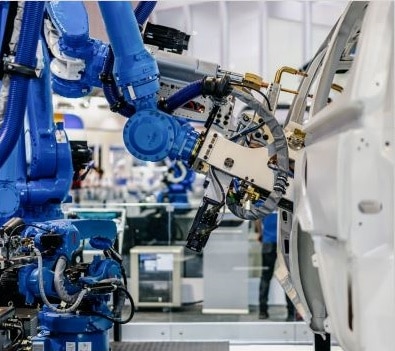The Future of AI Within Transport and Logistics – Technologist
The use of Artificial Intelligence (AI) is on the rise, with more and more of us using AI on a more regular basis, both within work and in our personal lives. In this article, we will discuss what AI is, the variations you could expect to see, some of the trepidation surrounding AI, and the benefits that it can provide to transport and logistics businesses.
What is AI?
Although Artificial Intelligence is a hot topic currently, it has been around much longer than many realise. First coined by English scientist Alan Turing in a paper published in 1950, AI was used as a term to measure computer intelligence. Furthermore, ‘computer intelligence’ was also explored by American psychologist Frank Rosenblatt in 1957 through his creation of Perceptron, an electronic device with self-learning capabilities. Over time, it has evolved into highly sophisticated technology, capable of swiftly executing complex tasks and learning autonomously.
Naveen Joshi, CEO of Allerin describes AI in his article in Forbes, “AI can be defined as a technology that powers machines with human intelligence”. AI, once a sci-fi dystopian concept, is now beginning to integrate within all fields of work, and its impact on transport and logistics is no exception.
Some variations of AI that we can already see
Autonomous Vehicles: This concept is potentially one of the most synonymous with AI. Self-driving vehicles are very close to becoming a norm, with large providers like Tesla leading the charge. In fact, the UK government pledged to allow self-driving cars onto roads by 2025. Inevitably, public transport may follow suit, with the possibility of aircraft eventually.
Traffic Management: With self-driving vehicles, autonomous traffic management on the roads may follow suit. Analysis of traffic information, such as typical driving hours, traffic density, and any events that could cause delays, can all be used to guide vehicles through a more efficient route. Reducing this congestion is more eco-friendly, more cost-effective, and will help to get passengers to their destinations much quicker.
Virtual Assistance: E-commerce has overtaken traditional high-street shopping, and consequently further investment into the digital customer experience has been heightened. Automated online ChatBots that immediately respond and react depending on the visitors’ questions, offer a more personalised and swift customer experience without human involvement.
Other types of AI that are commonplace now include technology such as ChatGPT for content creation, facial recognition tools for security and identification, navigation apps such as Google Maps that are using algorithms to understand traffic flow behaviours and much more.
Some concerns surrounding AI
The rapid advancement of AI raises apprehensions related to job displacement, ethical considerations, security, and a general lack of understanding. With AI’s limitless potential, anxiety has grown with many left wondering if it could be regulated appropriately. Balancing technological advancements with workforce sustainability is crucial to ease any anxiety, and drive AI adoption, within businesses. Greater education around AI, as well as ensuring data security measures are regulated is essential to protect users and businesses.
In response to growing concerns and apprehension surrounding AI, the European Union (EU) has introduced legislation to regulate Artificial Intelligence. They say, “Parliament’s priority is to make sure that AI systems used in the EU are safe, transparent, traceable, non-discriminatory and environmentally friendly. AI systems should be overseen by people, rather than by automation, to prevent harmful outcomes.”
How transport and logistics could benefit from AI adoption
The adoption of AI in transport and logistics introduces the potential for multiple benefits for operators. AI can help transform traditional practices into more efficient, sustainable, and technologically advanced processes. Integration with AI can help provide greater operational efficiency, minimise human errors, and provide more continuity within logistics processes.
Through real-time data analysis, AI can help facilitate route and load optimisation at a much faster pace, helping reduce fuel consumption and maximise asset usage. The technology’s predictive maintenance capabilities extend not only to vehicles but also to road infrastructure, ensuring optimal performance and safety.
For warehousing, AI enhances demand forecasting and future-proofing inventory management. Additionally, AI’s learning capabilities enable continuous improvement, and its reporting capabilities offer valuable insights for strategic decision-making for future stock requirements. In essence, AI adoption represents a positive shift, elevating transport and logistics into a position of heightened effectiveness and sustainability.
In an article for Forbes, CEO of MSM Digital, Mario Mirabella says “The future of AI is bright, and with the right approach, we can benefit from the advancements in AI technology while also tackling its challenges.” This extends to the transport and logistics just as much as other industries.
Is it imminent that AI-powered transport planning software will replace human planners in logistics companies?
The simple answer is, no. While routing and scheduling optimisation software does already utilise some elements of AI through algorithms for route calculations, it falls short in mapping all variables, restrictions, and conditions. Moreover, algorithms do not account for exceptions and spontaneous events that often occur within transport. This is where human involvement and transport planners play a crucial role, deploying their industry knowledge and experience to navigate aspects of logistics that software cannot address fully and autonomously.
For more information on how transport management software (TMS) can assist your planners, and help your operations to become more efficient, download the Mandata’s TMS Buying Guide (2024 Edition).
Conclusion
AI is already here – embrace it. As long as the governing bodies regulate it accordingly, transport businesses should look to capitalise on the benefits that it can offer.
Lee Johnson, Business Development Manager at Kainos, a leading IT consultancy company says, “As AI capabilities and the sector evolve, it is likely that this technology will play an increasingly significant role in shaping the future of transportation including reducing the number of road accidents, boosting operational efficiency, lowering pollution, and making transportation safer for all.” This highlights the fact that most businesses will be looking to adopt AI in some way or another, and those that dismiss AI could get left behind.


